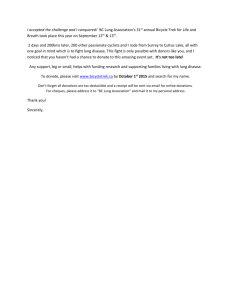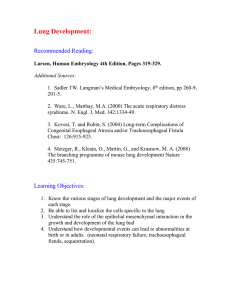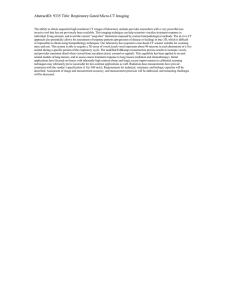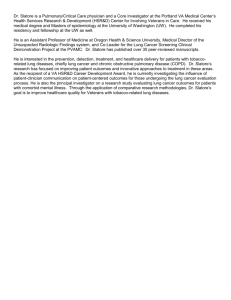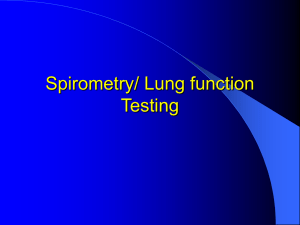Lung Cancer Still Kills Many, Yet Draws Little Research Funding
advertisement
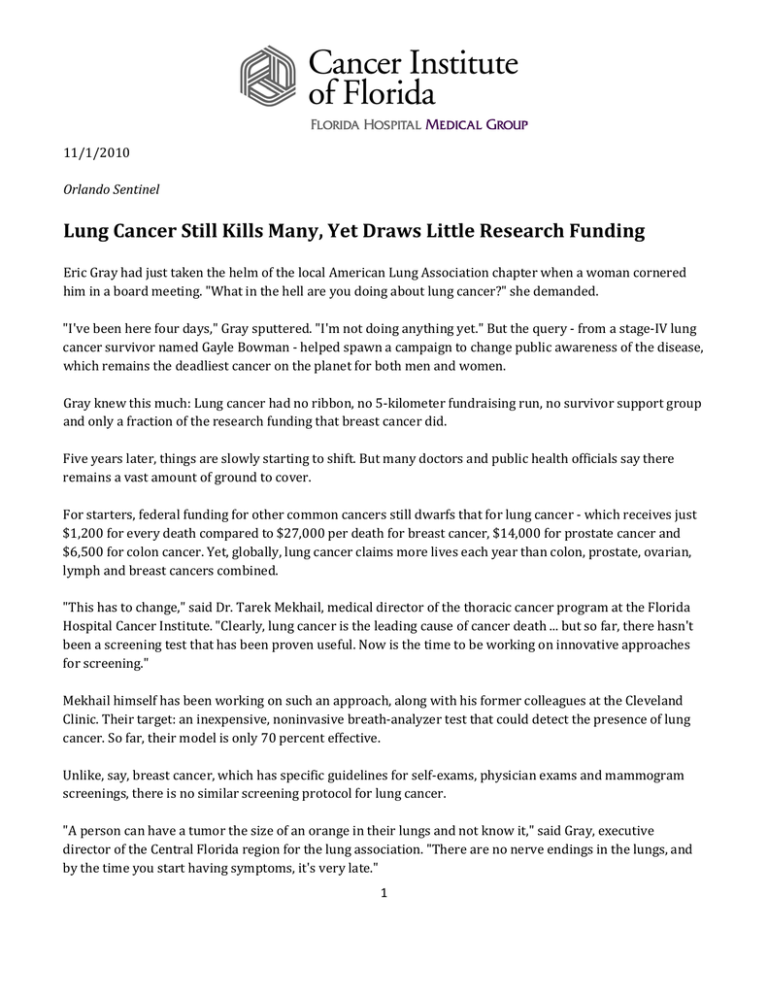
11/1/2010 Orlando Sentinel Lung Cancer Still Kills Many, Yet Draws Little Research Funding Eric Gray had just taken the helm of the local American Lung Association chapter when a woman cornered him in a board meeting. "What in the hell are you doing about lung cancer?" she demanded. "I've been here four days," Gray sputtered. "I'm not doing anything yet." But the query - from a stage-IV lung cancer survivor named Gayle Bowman - helped spawn a campaign to change public awareness of the disease, which remains the deadliest cancer on the planet for both men and women. Gray knew this much: Lung cancer had no ribbon, no 5-kilometer fundraising run, no survivor support group and only a fraction of the research funding that breast cancer did. Five years later, things are slowly starting to shift. But many doctors and public health officials say there remains a vast amount of ground to cover. For starters, federal funding for other common cancers still dwarfs that for lung cancer - which receives just $1,200 for every death compared to $27,000 per death for breast cancer, $14,000 for prostate cancer and $6,500 for colon cancer. Yet, globally, lung cancer claims more lives each year than colon, prostate, ovarian, lymph and breast cancers combined. "This has to change," said Dr. Tarek Mekhail, medical director of the thoracic cancer program at the Florida Hospital Cancer Institute. "Clearly, lung cancer is the leading cause of cancer death ... but so far, there hasn't been a screening test that has been proven useful. Now is the time to be working on innovative approaches for screening." Mekhail himself has been working on such an approach, along with his former colleagues at the Cleveland Clinic. Their target: an inexpensive, noninvasive breath-analyzer test that could detect the presence of lung cancer. So far, their model is only 70 percent effective. Unlike, say, breast cancer, which has specific guidelines for self-exams, physician exams and mammogram screenings, there is no similar screening protocol for lung cancer. "A person can have a tumor the size of an orange in their lungs and not know it," said Gray, executive director of the Central Florida region for the lung association. "There are no nerve endings in the lungs, and by the time you start having symptoms, it's very late." 1 Chest X-rays, CT scans and PET scans are the main screening tools used, but Gray said those tests misdiagnose as often as they get it right, subjecting patients to unnecessary biopsies. Because lung cancer diagnosis often comes late, nearly 60 percent of patients die within the first year of learning they have the disease, and 85 percent are dead within five years. Too often, it is only those who see a doctor for some unrelated condition that discover their cancer early, when the disease is most treatable. That was the case with Kathleen Skambis, now 53, an Orlando attorney. She was on her honeymoon 11 years ago when she developed a bad case of the flu that wouldn't go away. At the insistence of her new husband, she finally asked her doctor for a chest X-ray. It showed a spot in one lung. "But because I'd never smoked, they tried to make it everything but lung cancer," Skambis said. "Finally, they did a CT scan, and they found it - whatever it was - in the other lung too." A biopsy confirmed it was lung cancer, making Skambis among the 10 to 20 percent of lung cancer patients who are nonsmokers. And while some have other known risk factors - exposure to secondhand smoke or radon gas, for instance - she had neither. "I always get the question: 'Well, did you smoke?' " she said. "I understand the question, and I would have asked it myself once. But now it just kind of makes me mad. Nobody deserves to get lung cancer." In fact, Mekhail said, it is the stigma of lung cancer that hampers both funding and public awareness, even though some think the disease may be increasing among nonsmokers, especially women. Sixty-four-year-old Shelly Ferrone, a Longwood financial advisor, understands the inclination to blame smokers for their "stupidity," as she calls it. She became addicted to cigarettes herself before the risk was universally accepted. After 35 years of smoking up to three packs a day, she quit for good in 1993 - and was diagnosed with lung cancer four years later. "I think tobacco should be illegal," she said. "If I hadn't gone to the doctor for ulcerative colitis, I never would have known I had cancer. I was having no symptoms. None." The other stigma of lung cancer, though, comes from its death rate. There is a popular notion that patients whose disease has spread are invariably goners. 2 John Casterline, a 67-year-old Orlando retiree, begs to differ. In fact, the former career Navy man is now in training to hike the Pacific Crest Trail, a mountainous 2,650-mile trek from Mexico to Canada, starting next April. The adventure - a fundraising event for the lung association - will come four years after he finished treatment for stage IV lung cancer. His first symptom? A lump in his arm, followed by another in his buttocks. The lung cancer already had spread. "This was a godsend in a way, even though it had spread," he said. "My last treatment was Feb. 5, 2007 - and I've had no cancer since." He, Skambis and Ferrone all knock on wood when they say things like that. They know too many patients who thought they had lung cancer beaten, only to have it creep back. Gayle Bowman, the survivor who had cornered Gray, died in July 2008 after the cancer returned, this time in her brain. But until her death, she never did stop lobbying for more awareness, funding and treatment. Because of her, the Central Florida lung association office now has a support group of about 30 people. And recently, representatives from the national headquarters said they wanted to use the Florida initiative as a model for other states. "What we need is about 1,000 more people like Gayle," Gray said. "We need pioneers who will stand up and say, 'Enough.'" Kate Santich can be reached at 407-420-5503 or ksantich@orlandosentinel.com. 3


